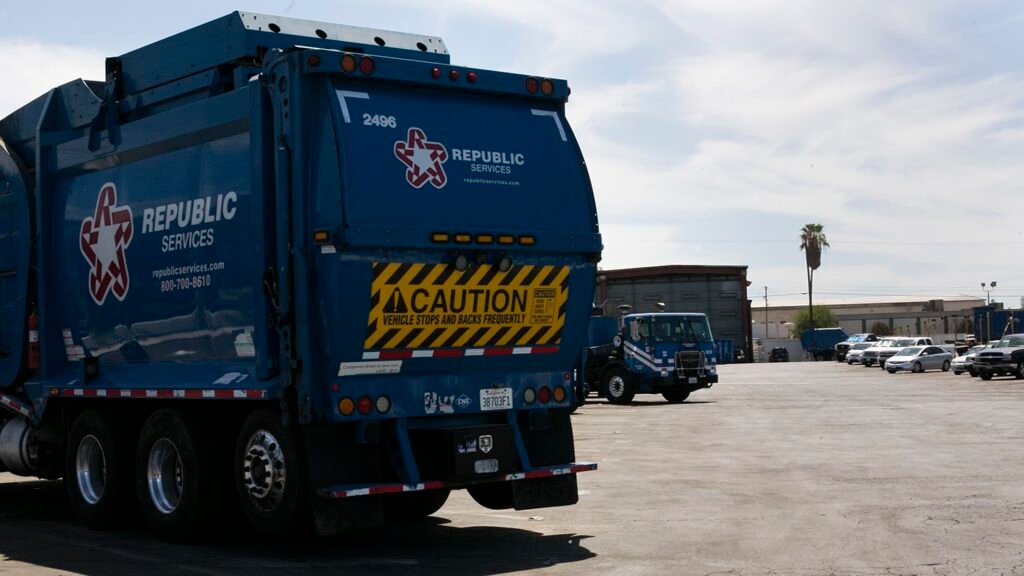Brea Officials Want Republic Services to Pay $5.4 Million After Labor Disputes
As the sun set over the quiet streets of Brea, California, residents found themselves staring at overflowing garbage bins, a stark reminder of a summer filled with disruption. The city, grappling with multiple labor disputes involving Republic Services—a prominent waste hauler in Orange County—has now made headlines in pursuit of $5.4 million in compensation. This amount not only includes reimbursements for recent work stoppages but also addresses the lingering effects of a 2021 strike that left residents without reliable waste collection for weeks.
Delayed Trash Pickups and Community Frustration
Brea City Manager Bill Gallardo, following an audit of Republic’s financial records, sent a letter in September demanding reimbursement for delays caused by labor disputes. “We are asking Republic Services for a breakdown of their records pertaining to the past disruptions, and we firmly believe they owe us this money,” Gallardo stated. Much of the requested amount accounts for liquidated damages due to delayed services, estimated at around $4.6 million.
The unresolved labor disputes have left many residents frustrated, struggling to cope with the overflow of trash. “People are tired of seeing their garbage cans spilling over every week. It’s unacceptable,” says local resident Maria Torres. “We depend on these services to maintain a clean environment.”
Impacted Communities
- Brea
- Anaheim
- Santa Ana
- Garden Grove
- Huntington Beach
- Fullerton
- Placentia
- Yorba Linda
- Seal Beach
The labor disruptions are not isolated incidents. In July, approximately 1,000 garbage collectors in Orange County allowed themselves to be pulled into a national movement, halting their work for a week in solidarity with striking workers in Boston. This nationwide labor action underscored a new generation of labor activism, catalyzing discussions about workers’ rights across the country.
The Legal and Financial Framework
Under the existing contract, workers are legally permitted to honor picket lines, enabling them to apply pressure on Republic when colleagues in other states seek betterconditions. James Richardson Jr., a spokesperson for Republic Services, responded to the city’s audit and request with skepticism. “We are reviewing the information in the city’s audit, but we strongly disagree with the city’s position on the applicability of liquidated damages,” he commented.
Reimbursements and customer credits, amounting to over $130,000, represent a particularly sensitive point for both the city and the residents. This would equate to roughly $12 per residential customer, a small relief in the wake of significant service interruptions.
Historical Context and Broader Implications
This isn’t the first time Republic Services has found itself at odds with local authorities. An earlier work stoppage in December 2021 saw 400 workers stuck in negotiations, leaving Brea and surrounding cities scrambling to manage escalating garbage piles, eliciting widespread community outrage and complaints. “We had people calling the city daily about their trash not being picked up,” Gallardo recounted.
The financial implications surrounding trash collection extend beyond mere inconvenience. A study conducted by Urban Waste Dynamics in 2022 revealed that unreliable waste management services can lead to increased community health risks and property devaluation, particularly in low-income areas. “It’s not just about trash; it’s about maintaining public health and preserving property values,” stated Dr. Eleanor Finch, an urban studies researcher.
Next Steps for Brea
With Brea’s officials awaiting a response from Republic Services, the outcome of this dispute will likely set a precedent for other municipalities grappling with similar issues. As cities across Orange County look over their shoulders, they may soon follow suit, pushing for their share of compensation to cover the fallout from labor disputes.
The current standoff not only reflects the struggles of waste management companies to maintain a stable workforce but also highlights a nationwide trend of workers advocating for fair wages and better working conditions. As strikes and work stoppages become more common, the implications for cities like Brea could shift dramatically, calling into question the very nature of municipal contracts and labor relations in the 21st century.
“It’s a reckoning for waste services,” says labor expert Dr. Samuel Mendelsohn. “Cities must rethink their relationships with service providers to ensure that such disruptions do not occur in the future.”
As the clock ticks towards an October deadline for reimbursement, residents of Brea hold their breath, wondering if their officials will secure the financial support needed to restore order amid the chaos.





